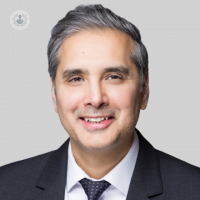ACL - A sports physician’s view
Written in association with:If you watch or take part in sports which involve changes of direction at high speeds, you’ll be familiar with the ACL and its susceptibility to serious injury. Unfortunately, partial or complete ACL tears are common to athletes at all levels. Leading sports and exercise medicine specialist Dr Shabaaz Mughal is here to tell us more.

What happens when the anterior cruciate ligament is injured or damaged?
Generally speaking, when this ligament, which is inside the knee joint and is important in providing stability to the knee, is injured it is usually from trauma to the knee or from a twisting mechanism if the foot gets stuck. It is often seen in sports like football, rugby and skiing, where there is a lot of twisting and turning involved. The knee will be painful, swell immediately and movement will be restricted, making it difficult to walk and bend the knee. Later the knee may feel unstable and give way.
When is surgery required to treat an anterior cruciate ligament injury?
In most cases this depends on the severity of the injury, level of function the patient is wanting to return to, the time frame for wanting to return to full function and the patients' thoughts and beliefs about surgery. The ACL is often injured in combination with other structures of the knee - the ligaments, the meniscus and the cartilage.
It is often good practice to reduce swelling and pain in the initial stages by following the PRICE protocol, in order to achieve better assessment of the knee. A sports physician will conduct a thorough consultation and further investigations such as MRI and X-ray, which will give a lot more information as to the exact diagnosis and any damage to other structures involved. This then allows the patient and the physician to make an informed decision together on the management ahead, taking into account the patient’s aims and expectations.
There is also value in a course of physiotherapy and rehabilitation prior to any decision about surgery to optimise the muscles around the knee which stabilise it. Then we can have a fuller picture of what limitations and restrictions still remain before considering surgery. Generally speaking, high levels of functioning in twisting and turning sports will require a surgical intervention, although I have managed elite athletes performing at the top of their profession with an ACL deficient knee.
Can an anterior cruciate ligament injury ever fully heal? Will further surgery be required?
Again, this depends on the degree of damage and whether there is a full rupture. These ligaments have a poor blood supply so do not heal too well without some intervention. However, a partial tear can certainly have a trial of conservative management potentially with some injection therapy and a good rehabilitation process.
What should patients know prior to surgery to fix damage to the anterior cruciate ligament?
I always think it’s important to know all possible options prior to surgery. It is a significant injury and requires long and committed rehabilitation. There will be ups and downs throughout this process. Doing the correct exercises, getting full strength back and achieving a full range of movement are crucial as is respecting the time frames for healing post-surgery. However, even surgical ACL repairs and grafts can fail or re-injure.
What does recovery involve and how long does it take to fully recover from an anterior cruciate ligament injury?
Often a six month rehabilitation time frame is mentioned for recovery from an ACL reconstruction. In my experience this is possible, but more often we see it take around nine months for professional athletes to return to their sport and get back to their previous pre-injury performance level. In some cases, it can take up to 12 months.
Rushing the process can often lead to longer term problems with recurrent swelling or even re-injury. It is important to take a holistic approach to rehabilitation focusing not only on the injury but all the joints and muscles around the knee, as the risk of picking up other injuries, especially muscle injuries, is quite common post-ACL injury. During rehabilitation it is imperative to initially stop the swelling and inflammation of the knee. Then it is about building up movement, strength, stability, balance and slowly over time introducing impact, changes in direction and finally twisting and turning with a return to sport. A good experienced physiotherapist will lead you through this process and it is a very important factor in getting back to the previous levels or even exceeding them.
If you are having trouble with your ACL or are experiencing any other effects of sport-related injury, you may want to visit Dr Shabaaz Mughal’s Top Doctors profile. There you’ll be able to view his scheduling information and request an appointment with him.


